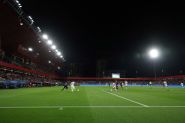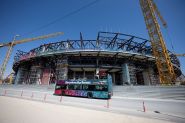
FC Barcelona, one of the most emblematic clubs in European football, has fallen on hard times in recent years, both in sporting and financial terms. The arrival of German coach Hansi Flick at the helm this summer has raised many hopes and questions.
Is he the man to put Barça back on the road to victory and dominance on the national and international stage?
That's the question we'll be exploring as we take a tactical look at Barça 2024-2025.
Who is Hansi Flick?
Hansi Flick, 59, is an experienced German coach who took over the reins of FC Barcelona at the start of the season. Prior to that, he coached the German national team, but his stint was marked by mixed results. However, it was his work at Bayern Munich that really made his reputation. With Bayern, he won the Champions League in 2020 and scored an impressive quintuple in the same year. His statistics with Barça are promising, averaging 2.57 points per game, which is higher than his performance with Germany (1.7 points per game) and slightly below his record with Bayern (2.53 points per game).
Under Flick’s leadership, FC Barcelona have impressed at the start of the season. The team is currently top of the Spanish league with 24 points, three ahead of Real Madrid. It is the team that has generated the most chances to score (xG) in La Liga and has the best attack. From a defensive point of view, Barça also control their games, as evidenced by the low number of saves made by their goalkeeper, indicating the team's ability to limit opponents' chances.
Flick's basic tactic is a 4-3-3, which can also be transformed into a 4-2-3-1 or even a 2-3-2-3, depending on the situation. The German coach emphasizes direct attacking play, with suffocating pressure and a very high defensive block, making his team the one with the most advanced block in Europe, on par with Losc (Lille) and just ahead of Manchester City. The fundamentals of Flick's tactics are to be direct and attacking, moving directly towards the opponent's goal. Flick insisted on this approach at his press conference, stating that Barça's tradition is to play with a lot of passing, but that he also wants his players to go towards the opponent's goal with determination.
The German coach also takes risks, as evidenced by the fact that Barça are the team with the most offside calls in Europe.
Barça's opponents have been flagged for offside 62 times this season. The team that occupies second place on the list, Osasuna, is far behind with 26. In academic research, this is called a “statistically significant” difference. A difference so significant that it cannot be attributed to chance alone. There has to be a reason. And that reason is a defense that knows how to do its job. And brilliantly.
This shows the risk-taking in pressing and the constant search for the advantage. Finally, Flick insists on the importance of being courageous, both with and without the ball. Players must show personality, break lines and make numerous runs, whether in attack or defense.
Striker Robert Lewandowski is central to Flick's tactics. He's able to drop back and create space, disrupting opposing defenses. Wingers, such as starlet Lamine Yamal and Raphinia, also play a crucial role in Flick's system. They make curved runs when pressing, helping to block opposing passing lines, and they make numerous deep calls, stretching the opposing defensive block.
Strengths and weaknesses
Barça has a number of strengths. Firstly, the team’s positivity and good ambiance are remarkable. The players seem happy to play together, which translates into a positive dynamic and cohesion on the pitch. Secondly, Lamine Yamal is an X-factor who can single-handedly make all the difference. This impressive striker, aged just 17, has made an outstanding start to the season and was one of the architects of Spain's Euro win.
However, the team also has its weaknesses. First and foremost, the position of goalkeeper is a question mark. With the injury to Marc-André Ter Stegen, Barcelona find themselves with a void to fill. Ter Stegen, though experienced, has not always been at his best recently, and his performances have been inconsistent. His replacement, Inaki Pena, will have a chance to make his mark, but Barça have made a decision by signing Polish goalkeeper Wojciech Szczęsny, who returns from retirement to take up the challenge.
Secondly, the team is young and perhaps lacks experience at crucial moments. With many young talents, Barça could lack maturity in high-intensity matches, as we saw in the defeat to AS Monaco.
The numerous injuries in the squad are also a recurring problem for Barça. Many key players, such as Ter Stegen, Christensen, Bernal, Gavi, De Jong, Fermin Lopez and Dani Olmo, are currently injured, weakening the team and limiting Flick's options.
Finally, pressing can leave space for opposing full-backs. Flick's system, with wingers making curved runs, can create space on the flanks, which could be problematic against teams with good wingers.
For Flick and FC Barcelona, the 2024-2025 season must be one of reconquest. The main objective is to win as many titles as possible, including of course La Liga, by beating Real Madrid and Atlético de Madrid, who are also title contenders.
Flick has brought a new dynamic to FC Barcelona, with a spectacular attacking style of play. The team is currently top of the league with impressive performances. While injuries can be an obstacle, the German coach has the ability to guide Barça to the top and restore its place among Europe's top clubs. It promises to be an exciting season for the Blaugrana fans, who hope to see their team return to its former glory.




Comments